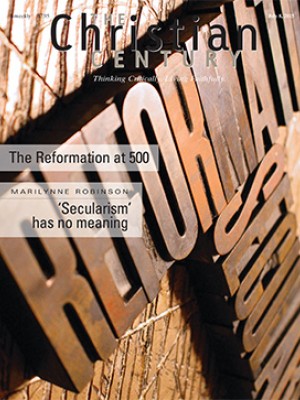China knocks down crosses, faithful put them back
(The Christian Science Monitor) A group of Protestant churches in China’s Zhejiang Province are engaging in civil disobedience against local authorities who have knocked down the crosses from atop their churches: they are fighting back and restoring the traditional symbol of Christianity.
In some cases, the often elderly resisters in 16 churches around the cities of Lishui and Fuyang have persistently replaced the cross three times in a single day. So far, the restored crosses—some made of raw lumber—remain.
Such actions are part of an intensifying standoff between the faithful and party authorities following a state campaign to target Protestants in places where their numbers are growing and their churches are visible. A number of churchgoers who have reaffixed the crosses late at night or early in the morning said they are acting out of conviction and aren’t afraid. Pastors in China are concerned, however, that the activity in Zhejiang is a prelude to a larger crackdown.
Read our latest issue or browse back issues.
The recent pushback began in May after the provincial government announced that crosses must come off all churches in the province. That brought a rare open letter from the region’s largest evangelical church stating that the policy is “likely to cause chaos . . . and religious conflicts.”
Zan Aizong, a local evangelical, said in a telephone interview that “the churches are restoring their cross over and over again. . . . They are being bold and very courageous.”
Since December 2013, police in Zhejiang have stripped crosses from more than 450 churches, according to China Aid, a Texas-based Christian human rights monitor. Police with large cranes have often shown up with no warning. They have demolished prominent sanctuaries, including the $5 million Sanjiang Church in Wenzhou just as it was completing construction.
Unlike previous campaigns that lasted a few months, the current “three rectifications and one demolition” policy has lasted at least two years. It has been part of a media campaign aimed at churches and now includes the infiltration of congregations in Wenzhou in the attempt to discover party members and their families who worship. In the Communist Party state, being both Christian and a party member is not allowed.
Authorities in Zhejiang have not given an explanation for the new policy. But analysts say Beijing is concerned about the growth of evangelical Christianity in Communist China, which is officially atheist. Estimates run from 50 million to more than 100 million Protestants and about 6 million Catholics in a country where party members number 70 million. The Zhejiang coastal city of Wenzhou, known as “China’s Jerusalem” for its religious ferment, has 1.2 million evangelicals in a population of 9 million.
The campaign in Zhejiang is notable for its scope, but also for targeting official Protestant Three-Self churches. These churches are legal and registered and consider themselves loyal to the Chinese state. (Authorities have waged a less visible campaign against the proliferation of illegal “house” churches in Zhejiang.)
“For the past two years, more Three-Self churches are being targeted, so we can expect more resistance from them,” said Teng Biao, a human rights lawyer from Beijing now in residence at Harvard Law School in Cambridge, Massachusetts.
In May the government ceased tearing down crosses but issued a ban on all crosses atop churches through a new religious structures building code. The code stipulates that crosses be removed, reduced in size, and affixed to the side of the edifice in the same color as the building, rendering them hard to see.
The leadership of Chongyi Church in Hangzhou—one of the largest Christian churches in China with more than 10,000 in weekly attendance—openly protested the new policy. The protest letter ran on the church website but disappeared after a week.
The letter is “important, since the Three-Self churches tend to be supportive of the government,” said Teng, who has argued religious freedom cases in China.
The Chongyi letter cites the Constitution, saying the nation is bound to “rules that respect the traditions and customs of all religions.” Efforts to remove a fixture that “for 2,000 years” has been a sign of “faith and love” on top of churches doesn’t show respect, it stated.
The letter goes on to state that building and architectural codes in cities have always been adapted to specific places and structures, and a blanket ban on all crosses goes past their legal scope.
Further, knocking down crosses amounts to “excessive interference” by authorities, the letter said. The language of the new rules is “vague . . . with little accuracy” and is “likely to cause chaos in execution and religious conflicts,” it continues. To create new rules for all religious buildings but in a way that only touches Protestants and Catholics, its authors write, is prejudicial and unjust.
This article was edited on June 22, 2015.





